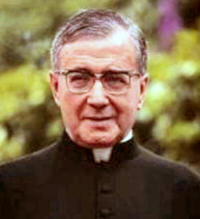Ordinary Time: June 26th
Saturday of the Twelth Week of Ordinary Time; Optional Memorial of St. Josemaría Escrivá de Balaguer, priest (in some dioceses)
Other Commemorations: Sts. John and Paul, Martyrs (RM); St. Pelagius of Córdoba, Martyr (RM); Bl. Jacques Ghazir Haddad, Priest ; Other Titles: Josemaria Escriva de Balaguer
» Enjoy our Liturgical Seasons series of e-books!
St. Josemaría Escrivá was born in 1902 at Barbastro Spain. He was ordained in Saragossa in 1925 and by divine inspiration founded Opus Dei which opened a new way for the faithful to sanctify themselves in the midst of the world. He died on June 26, 1975 and was canonized a saint on October 6, 2002.
According to the 1962 Missal of Bl. John XXIII the Extraordinary Form of the Roman Rite, today is the feast of Sts. John and Paul, martyrs, two brothers, who encouraged each other to remain faithful in their sufferings. They are named in the Roman Canon of the Mass (Eucharistic Prayer I).
St. Josemaría Escrivá de Balaguer
St. Josemaría Escrivá was born in Barbastro, Spain, on January 9, 1902. He had five siblings: Carmen (1899-1957) and Santiago (1919-1994) and three younger sisters who died when they were small children. His parents, José and Dolores, gave their children a deep Christian education.
In 1915, Jose Escrivá's business failed and he found other work, which required the family to move to Logrono. It was as a teenager in Logrono that Josemaria for the first time sensed his vocation. Moved by the sight of footprints left in the snow by a barefoot friar, he sensed that God was asking something of him, though he did not know exactly what it was. He thought becoming a priest would help him discover and fulfill this calling from God, so he began to prepare for the priesthood, first in Logrono and later in Saragossa.
Josemaría's father died in 1924, leaving him as head of the family. After his ordination in 1925, he began his ministry in a rural parish, and subsequently continued it in Saragossa. In 1927, Fr. Josemaría's bishop gave him permission to move to Madrid to obtain his doctorate in law.
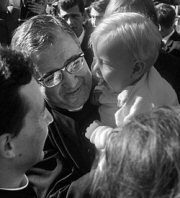 On October 2, 1928, during a spiritual retreat, Fr. Josemaria saw what it was that God was asking of him: to found Opus Dei, a way of sanctification in daily work and in the fulfillment of the Christian's ordinary duties. From then on he worked on carrying out this task, meanwhile continuing his priestly ministry, particularly to the poor and the sick. During these early years of Opus Dei, he was also studying at the University of Madrid and teaching classes in order to support his family. When the Civil War broke out in Madrid, religious persecution forced Fr. Josemaría to exercise his priestly ministry clandestinely and to move from place to place seeking refuge. Eventually, he was able to leave the Spanish capital; and, after a harrowing escape across the Pyrenees, he took up residence in Burgos. When the war concluded in 1939, he returned to Madrid and finally obtained his doctorate in law. In the years that followed he gave many retreats to laity, priests, and religious, and continued working assiduously to develop Opus Dei.
On October 2, 1928, during a spiritual retreat, Fr. Josemaria saw what it was that God was asking of him: to found Opus Dei, a way of sanctification in daily work and in the fulfillment of the Christian's ordinary duties. From then on he worked on carrying out this task, meanwhile continuing his priestly ministry, particularly to the poor and the sick. During these early years of Opus Dei, he was also studying at the University of Madrid and teaching classes in order to support his family. When the Civil War broke out in Madrid, religious persecution forced Fr. Josemaría to exercise his priestly ministry clandestinely and to move from place to place seeking refuge. Eventually, he was able to leave the Spanish capital; and, after a harrowing escape across the Pyrenees, he took up residence in Burgos. When the war concluded in 1939, he returned to Madrid and finally obtained his doctorate in law. In the years that followed he gave many retreats to laity, priests, and religious, and continued working assiduously to develop Opus Dei.
In 1946 Fr. Josemaría took up residence in Rome. During his years in Rome, he obtained a doctorate in Theology from the Lateran University and was appointed by Pope Pius XII as a consultor to two Vatican Congregations, as an honorary member of the Pontifical Academy of Theology, and as an honorary prelate.
He traveled frequently from Rome to various European countries, and to Mexico on one occasion, to spark the growth of Opus Dei in those places. In 1974 and 1975, he made two long trips to a number of countries in Latin America, where he met with large groups of people and spoke to them about their Christian vocation to holiness.
Msgr. Escrivá died in Rome on June 26, 1975. By the time of his death, Opus Dei had begun in dozens of countries and had touched countless lives. After his death thousands of people, including more than a third of the world's bishops, sent letters to Rome asking the Pope to open his cause of beatification and canonization.
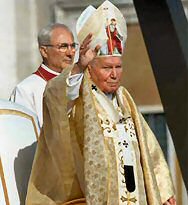 Pope John Paul II beatified Msgr. Escrivá on May 17, 1992, in St. Peter's Square in Rome. The ceremony was attended by approximately 300,000 people. "With supernatural intuition," said the Pope in his homily, "Blessed Josemaría untiringly preached the universal call to holiness and apostolate."
Pope John Paul II beatified Msgr. Escrivá on May 17, 1992, in St. Peter's Square in Rome. The ceremony was attended by approximately 300,000 people. "With supernatural intuition," said the Pope in his homily, "Blessed Josemaría untiringly preached the universal call to holiness and apostolate."
Ten years later, on October 6, 2002, John Paul II canonized the founder of Opus Dei in St. Peter's Square before a multitude of people from more than 80 countries. In his discourse to those who attended the canonization, the Holy Father said that "St. Josemaría was chosen by the Lord to proclaim the universal call to holiness and to indicate that everyday life, its customary activities, are a path towards holiness. It could be said that he was the saint of the ordinary."
Patronage: Opus Dei; People with diabetes
Symbols and Representation: Priest attire; Rosary
Highlights and Things to Do:
- Read more about St. Josemaria:
- Visit this Escriva Works to read St. Josemaría Escrivá's writings, especially The Way. "The book appeared first in 1934 under the title Consideraciones espirituales and later (in 1939) received its definitive title, after being greatly expanded. Over the years, more than four and a half million copies have been sold, in 43 different languages. This is one of the main attractions of the book — its direct, conversational style, its personal and deeply human character."
- Find out more about the St. Josemaria Institute.
- View this video on St. Josemaría Escrivá at YouTube.
- Visit Opus Dei's official US website.
- See Catholic Cuisine for food ideas for St. Josemaría.
- St. Josemaría's remains are interred in the Our Lady of Peace, Prelatic Church of Opus Dei, in Rome.
Sts. John and Paul
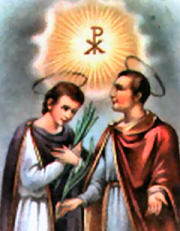 The Acts of these two martyrs, which historians regard as spurious, contain the following: "The two brothers, John and Paul, were valets to Constantia, the daughter of Emperor Constantine. For their excellent work she bequeathed to them a considerable sum. This they used to aid poor Christians. When Julian the Apostate (361-363) invited them to become members of the inner circle of the imperial household, they refused and boldly explained that they did not relish close association with one who had fallen away from Jesus Christ. The Emperor gave them ten days to reconsider their position, threatening them with death if at the end of this time they refused to do his bidding and sacrifice to Jupiter. The brothers used the interval to distribute what remained of their possessions to the poor so that they could begin their journey home to God with less hindrance, while at the same time benefiting many who would 'receive them into the everlasting dwellings' (Luke 16:9). Their choice was death, and they were beheaded in their own house."
The Acts of these two martyrs, which historians regard as spurious, contain the following: "The two brothers, John and Paul, were valets to Constantia, the daughter of Emperor Constantine. For their excellent work she bequeathed to them a considerable sum. This they used to aid poor Christians. When Julian the Apostate (361-363) invited them to become members of the inner circle of the imperial household, they refused and boldly explained that they did not relish close association with one who had fallen away from Jesus Christ. The Emperor gave them ten days to reconsider their position, threatening them with death if at the end of this time they refused to do his bidding and sacrifice to Jupiter. The brothers used the interval to distribute what remained of their possessions to the poor so that they could begin their journey home to God with less hindrance, while at the same time benefiting many who would 'receive them into the everlasting dwellings' (Luke 16:9). Their choice was death, and they were beheaded in their own house."
Both John and Paul were highly venerated by the Roman Church. They are mentioned in the Canon of the Mass and in the Litany of the Saints. Their particular virtue was love toward the poor. The following, at least, is historically certain: these two court officials were martyred and buried in their own house. Byzas and Pammachius transformed this house into a church dedicated to the two martyrs. Excavations have proven these points. Beneath the church were found their home, the tombs, and the place of execution.
—Excerpted from The Church's Year of Grace, Pius Parsch
Symbols and Representation: Thunderbolt; sword
Highlights and Things to Do:
- Read more about Sts. John and Paul:
- See the statues of Sts. John and Paul in the St. Peter's Basilica Colonnade, John and Paul.
- Their relics are located in Basilica dei Santi Giovanni e Paolo (Basilica of Saints John and Paul) in Rome.
St. Pelagius of Córdoba
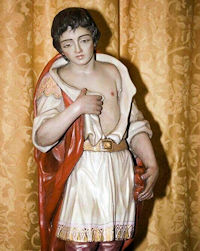 St. Pelagius was a thirteen year old Christian who was martyred for refusing to denounce his faith and convert to Islam in Cordoba, Spain in 925.
St. Pelagius was a thirteen year old Christian who was martyred for refusing to denounce his faith and convert to Islam in Cordoba, Spain in 925.
10th century Cordoba was the most powerful and glorious time in the world for the Muslim caliphates and they boasted the largest mosque outside of the Caaba in Mecca.
Pelagius, as a ten-year-old boy, was taken hostage by the Moors of Cordoba during a rampage in a Christian town. He was in captivity for three years and nobody had made any attempt to ransom him.
The Emir of Cordoba offered him his freedom if he would convert to Islam. The boy refused and the Emir had him tortured and killed. He is said to have endured six hours of constant excruciating pain until he died.
Saint Pelagius is venerated in Leon, Cordoba, and Oviedo, where his relics have been kept since they were transferred there in 985.
—Excerpted from Catholic News Agency
Patronage: abandoned people; torture victims; Castro Urdiales, Spain; Muina, Ovaro, Italy; Torreira, Portugal
Highlights and Things to Do:
- Read more about St. Pelagius:
- See some beautiful art images of St. Pelagius at Christian Iconography.
- His relics are located in the Oviedo Cathedral.
Bl. Jacques Ghazir Haddad
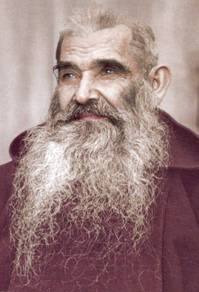 Fr Jacques Ghazir Haddad was born on 1 February 1875, in Ghazir, Lebanon, the third of five children. He attended school in Ghazir and then the College de la Sageese in Beirut, where he studied Arabic, French and Syriac.
Fr Jacques Ghazir Haddad was born on 1 February 1875, in Ghazir, Lebanon, the third of five children. He attended school in Ghazir and then the College de la Sageese in Beirut, where he studied Arabic, French and Syriac.
In 1892 he went to Alexandria, Egypt, to teach Arabic at the Christian Brothers' College, and there he felt the call to the priesthood. He entered the Capuchin Convent in Khashbau the next year. He was ordained a priest on 1 November 1901 in Beirut, Lebanon.
As an itinerant preacher from 1903 to 1914 he walked all over Lebanon proclaiming the Word of God and was given the name "the Apostle of Lebanon". He was also seen preaching in Syria, Palestine, Iraq and Turkey.
In 1919 he bought a piece of land on the hill of Jall-Eddib, north of Beirut, where he built a chapel dedicated to Our Lady of the Sea. Nearby he erected a great Cross.
Fr Jacques was tireless, he would help anyone in need following in the footsteps of St Francis of Assisi. In 1920, to assist him in this mission to help the sick and the poor, he founded the Franciscan Sisters of the Holy Cross of Lebanon.
The modest work of Fr Jacques aroused the people's admiration, many poor and sick people began to go to the "Cross" and Fr Jacques would welcome them all. In 1950 the "Cross" became exclusively a psychiatric hospital, one of the most modern in the Near East. The movement of charity began to spread throughout Lebanon and Fr Jacques and his Sisters multiplied their works of social assistance.
In 1933 he opened the House of the Sacred Heart in Deir el-Kamar, a girls' orphanage, which later became an asylum for the chronically ill. In 1948 he opened the Hospital of Our Lady for the aged, the chronically ill and the paralyzed. In 1949 St Joseph's Hospital became one of the most important medical centres of the capital.
It was followed in 1950 by St Anthony's House in Beirut for beggars and vagabonds whom the police found on the streets and Providence House for homeless girls.
Even though Fr Jacques was very busy with the hospital mission, he and his Sisters carried on the important work of education and opened several schools as well as an orphanage for 200 girls.
Fr Jacques was worn out by vigils, fatigue and travel. Although he suffered from numerous illnesses, became almost completely blind and was stricken with leukemia, he did not stop blessing God and working. He was lucid to the end, his last hours were an uninterrupted series of prayers invoking the Cross and the Virgin Mary until he died on 26 June 1954 in Lebanon.
His cause for Beatification was introduced in February 1979; on 24 February 1979, His Holiness Pope John Paul II signed the Decree of Introduction of the Cause for Beatification.
On Sunday, 22 June 2008, he was beatified during a special Mass in Beirut by Cardinal José Saraiva Martins, C.M.F., Prefect of Congregation for the Causes of Saints.
Since Bl. Haddad's death additional hospitals have opened to assist those injured during the war and to assist the Kabr-Chemoun region where medical services were scarce.
—Excerpted from Libreria Editrice Vaticana
Highlights and Things to Do:
- Read more about this Maronite saint:


